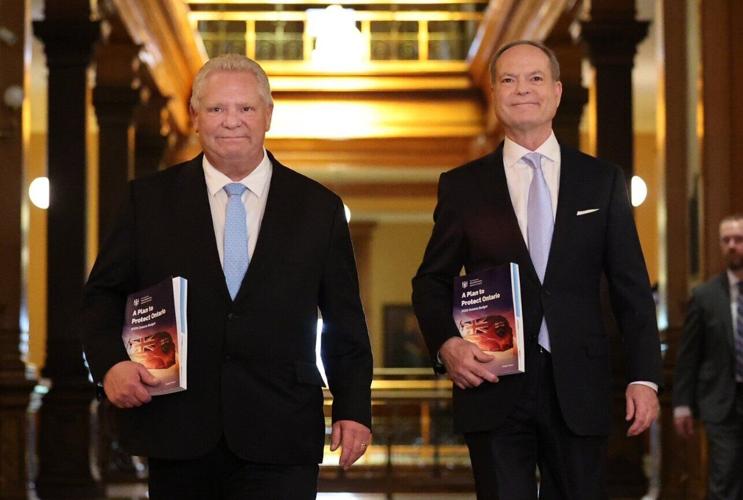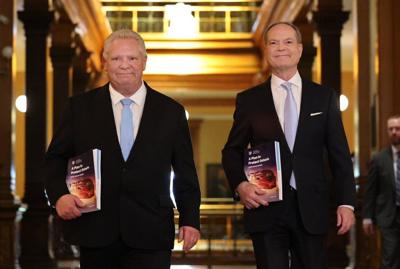Woe Canada, Ontario claims to stand on guard for thee.
With the economy battered by U.S. President Donald Trump’s trade war and unemployment rising, Premier Doug Ford’s government has tabled a record $232.5-billion provincial budget to “protect Ontario” and promote national unity.
“When all of Canada wins, Ontario wins,” Finance Minister Peter Bethlenfalvy said Thursday in a boosterish speech that noted “it is amazing to witness the burst of patriotism across our province and our great country” in the face of Trump’s tariffs.
Wary of smouldering secessionist sentiment in Alberta, Bethlenfalvy stressed “all levels of government need to work together to tackle the most pressing issues facing Ontario and Canada today … and deliver on nation-building projects such as reactors, seaports, railroads, pipelines and refineries.”
That means encouraging Prime Minister Mark Carney’s new Liberal government to “clear the maze of bureaucracy and red tape, barriers like Ottawa’s Bill C-69,” to allow energy infrastructure to be built more quickly.
With Trump’s tariffs — real and threatened — triggering economic uncertainty, the recently re-elected Progressive Conservative government is launching a new $5-billion “Protecting Ontario Account” to give immediate emergency cash supports to businesses affected by the slowdown.
“Tariffs have created an economic challenge across Ontario — and it is our communities who are hurting the most,” the treasurer said in a budget address that mentioned “Canada” 33 times and “Ontario” 70 times, but, unlike the April 15 throne speech, did not cite Trump by name.
Indeed, unemployment in the province now sits at 7.8 per cent — above the national rate of 6.9 per cent — and a full percentage point higher than the 6.8 per cent this time last year. In 2023, it was five per cent.
To tackle that, Bethlenfalvy is earmarking $20 million for new training and support centres “providing immediate transition supports for laid-off workers, including those impacted by U.S. tariffs,” over and above the $2.5 billion promised for skills development and retraining programs over three years.
With growth expected to sputter to just 0.8 per cent this year, the Tories are giving the economy a cash infusion with borrowed money, adding $5 billion to the Building Ontario Fund for affordable housing, long-term-care homes and energy projects, and tripling to $3 billion a fund to help Indigenous communities build infrastructure.
Touting a slew of initiatives to promote consumption of domestic goods from cars to cannabis, Bethlenfalvy decreed that the Friday before Canada Day will hitherto be known as “Buy Ontarian, Buy Canadian” day to promote local products.
It will be “held annually on the last Friday in June to help consumers support local businesses and workers through programs such as Ontario Made, Ontario Wood, Vintners Quality Alliance (VQA) for wine, and Foodland Ontario.”
That dovetails with the push from Ford and Carney to eliminate interprovincial trade barriers by July 1, which the premier and prime minister maintain could add $200 billion to the Canadian economy.
Along with measures to boost sales of red wine, there was a lot of red ink in the budget, the first to be tabled since Ford’s three-term Tories were re-elected Feb. 27.
Last year’s projected $9.8-billion deficit turned out to be a $6-billion shortfall.
But the $4.6-billion deficit previously forecast for 2025-26 has ballooned to an anticipated $14.6 billion — a $10-billion increase due to spending on tariff-related measures.
A month ago, Ford announced he would temporarily defer some provincial taxes through to Oct. 1, freeing up about $9 billion in cashflow for 80,000 tariff-hit employers to keep workers on the job. He also gave businesses an additional $2 billion in rebates through the Workplace Safety and Insurance Board (WSIB).
Bethlenfalvy said the deficit would be $7.8 billion next year before the government goes back into the black with a $200 million surplus in 2027-28.
“We are seeing our debt-to-GDP ratio — which is an excellent way to measure an economy’s fiscal health — near the lowest levels in almost 15 years, and now we can use that balance sheet to protect workers and businesses,” he told the legislature.
Ontario’s debt has jumped to a projected $489.8 billion this fiscal year — up $166.8 billion since Ford’s Tories took office thanks in part to the COVID-19 pandemic. That’s a staggering 51.6 per cent increase from the $323-billion debt inherited from the previous Liberals of premier Kathleen Wynne seven years ago.
Queen’s Park will spend $16.2 billion on interest payments in 2025-26 — greater than the budgets of every single ministry except Health ($81.9 billion), Education ($42.7 billion) and Children, Community and Social Services ($20.4 billion) — climbing to $17 billion next year.
NDP Leader Marit Stiles said the Tories are spending more while Ontarians are getting less for their tax dollars.
“This is a Band-Aid budget, a missed opportunity to strengthen Ontario,” said Stiles.
Liberal Leader Bonnie Crombie said her party supports “providing stimulus to ride through this critical time.”
“But in the long term, what’s in it for the people who are still waiting 20 hours in an emergency room for care?” she said.
Green Leader Mike Schreiner said the fiscal plan “utterly fails” on improving housing affordability.
“We will not tariff-proof Ontario if people can’t afford to live in this province. We are not helping the people who need the help, the most low- and middle-income families,” said Schreiner.
As first disclosed by the Star on Wednesday, Bethlenfalvy’s 232-page spending plan says that beyond the bike lanes the province wants removed from Bloor Street, Yonge Street and University Avenue, bikeways will be taken off of Queen’s Park Crescent and Avenue Road in order to have more car lanes.
“Ontario is reconfiguring some of Toronto’s most congested streets,” the budget stated in a section that also included Ford’s controversial scheme to tunnel under Highway 401 from Mississauga to Scarborough in order reduce gridlock.
The spending blueprint reiterated the Tories’ commitment to expanding TTC and GO Transit services and boasts that “major construction … is now complete” for the Eglinton Crosstown and the Finch West LRTs, but did not specify opening dates for those delayed projects.
Construction began on the 19-kilometre Crosstown LRT in 2012 under former Liberal premier Dalton McGuinty. The Star has reported it could finally open in September.
Finally, buried on the last page of the budget, there will be a new law that will allow former cabinet ministers of all political stripes to call themselves “Honorary Members of the Executive Council.”
That means they can use the honorific “the honourable,” bringing Ontario in line with titles enjoyed by ex-ministers in Ottawa and other provinces.
With files from Rob Ferguson
Error! Sorry, there was an error processing your request.
There was a problem with the recaptcha. Please try again.
You may unsubscribe at any time. By signing up, you agree to our and . This site is protected by reCAPTCHA and the Google and apply.
Want more of the latest from us? Sign up for more at our newsletter page.
































To join the conversation set a first and last name in your user profile.
Sign in or register for free to join the Conversation